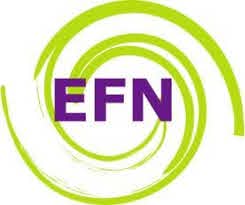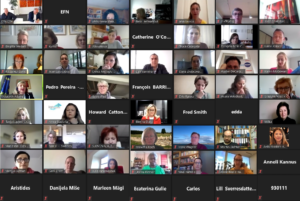15 april 2021
De Algemene Unie der Verpleegkundigen van België is a member of EFN.
 The EFN Members’ National Nurses Associations met online, on 15 April 2021, for the Spring EFN General Assembly, focusing on key points to take EFN EU lobby work further, and to get political results within the EU Institutions, especially in this difficult time of the COVID-19 crisis.
The EFN Members’ National Nurses Associations met online, on 15 April 2021, for the Spring EFN General Assembly, focusing on key points to take EFN EU lobby work further, and to get political results within the EU Institutions, especially in this difficult time of the COVID-19 crisis.
Ana Rita Cavaco, Ordem dos Enfermeiros President, welcomed the EFN Members to the General Assembly, stressing that “We are living turbulent times, the health situation across Europe is still extremely uncertain and delicate. The impact of the pandemic on the economy and society are unprecedented. Nurses are the backbone of all communities and with growing healthcare demands, we cannot allow the number of experienced nurses to continue to leave the profession. There is an urgent need to support and retain our current workforce. We need to make our voice heard and we need urgent actions from governments, including making improvements to pay and working conditions, and provide the appropriate mental health support to help them deal with the traumas of the past year.”
This was a good opportunity to share key information on the European Commission 2021 priorities and to emphasise the importance of following up the Action Plan of the European Pillar of Social Rights, to seize the opportunities for a healthy recovery post COVID-19, including the Multiannual Financial Framework 2021-2027 and the NextGenerationEU, also known as “Recovery Fund or Recovery Plan”, crucial instruments to build the resilience of the nursing workforce in the EU. Within this context of recovery, it is important to implement the EFN Workforce Matrix 3+1, which builds on the EU Directive 2013/55/EU and the EFN Competency Framework for General Care Nurses. The importance of qualified and competent nursing personnel is intrinsically linked to appropriate, safe and high-quality care for all patient and citizens in all health settings.
The EFN Members discussed and approved 3 key Policy Statements: on “Nurses’ Mentorship”, linked to the EFN EU Project QualMent; on the “Gender-Based Violence Against Nurses”; and one on “Nurses Co-Designing Artificial Intelligence Tools”. The involvement of EFN in 4 EU-funded projects as end-user partner is key to translate EFN Position Statements into frontline practice. The EFN is currently involved in QualMent, coming to end in September 2021; in 2 EHR H2020 projects InteropEHRate and Smart4Health; and IMMUNION, just launched, focusing on vaccination hesitance, linking to the work of the Coalition for Vaccination for Healthcare Professionals, of which EFN is a co-chair, together with CPME and PGEU.
The EFN Members also provided information on the possible gender or profession-based violence and/or discrimination that nurses may be experiencing at the national level. This valuable information is extremely important for the EFN to lobby the EU institutions, and in particular the European Commission, DG Justice, when they publish new funding and tender opportunities on EU Projects for tackling these issues, and make sure nurses are better prepared, protected and supported.
Finally, the EFN Members reaffirmed their dedicated commitment to ensuring that nurses’ united voice is heard at EU level and considered in the design of fit-for-purpose policies that affect the nursing profession. The Pact for Skills, especially digital skills, is an important EU action to build resilience. The COVID-19 pandemic still has an enormous impact across all layers of society. During such times of health crisis, it is vitally important to support frontline nurses, to respond to the challenges without compromising their safety and wellbeing, and to continue to encourage investment in the nursing workforce to combat the enormous shortages.















